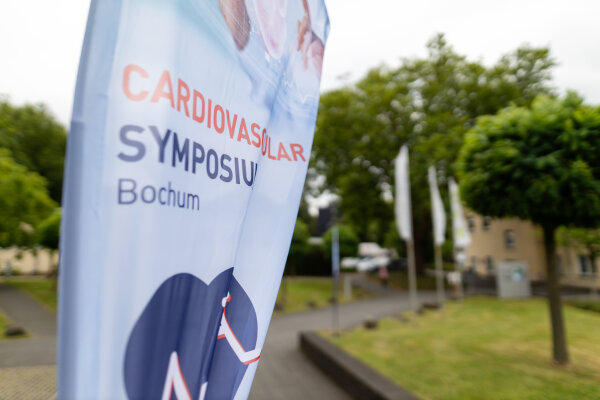2025-07-04

From June 27–29, 2025, the Ruhr-University Bochum proudly hosted the international symposium “Personalized Medicine in the Cardiometabolic Spectrum: From Mechanisms to Therapeutic Targets.”
This three-day event brought together over 300 scientists and clinicians from across Europe and beyond, offering a highly interactive platform to exchange the latest advances in clinical, translational, and experimental cardiovascular medicine.
Interdisciplinary and High-Level Science
With over 60 expert speakers, the symposium featured sessions on:
• Heart failure (HFpEF and HFrEF), rhythmology, and device therapies
• Inflammation, immunometabolism, and omics-based cardiovascular research
• Sex- and gender-specific medicine and diversity in care
• Gene and RNA-based therapies in cardiovascular disease
• Valvular interventions, amyloidosis, and cardiogenic shock
• Lipoproteins, treatments, and cardiovascular prevention strategies
The program uniquely bridged cardiology with nephrology, neurology, and internal medicine, highlighting the complex organ crosstalk. Sessions on the cardio-renal-metabolic axis and neuro-cardiovascular inflammation demonstrated the urgent need for cross-disciplinary approaches in personalized medicine.
While multi-day cardiology symposiums exist internationally, our event stands out as one of the first in Germany to integrate cardiovascular, metabolic, renal, and neurological research over three consecutive days, featuring both international and German-language sessions, dedicated diversity workshops, and a strong platform for early-career scientists across Europe.
Diversity, Collaboration, and Education
A dedicated Diversity Day focused on gender equity in cardiology and diversity-sensitive teaching in medicine. The symposium also included German-language sessions for national accessibility, covering lipid disorders, hypertrophic cardiomyopathy, valvular interventions, and arrhythmias.
Each day featured oral and poster presentations selected from submitted abstracts by young scientists across Europe, showcasing excellence in early-career cardiovascular, metabolic, and translational research, and fostering mentorship and scientific exchange.
The symposium concluded with a keynote lecture on cardio-immunology as a next-generation frontier, followed by a prize ceremony for best abstract presentations.
This landmark event has set a new standard for interdisciplinary scientific symposia in Germany, uniting clinical excellence, translational innovation, and inclusive education, and has laid the foundation for future annual editions.
Importantly, the symposium sparked multiple new scientific collaborations across institutions and disciplines, paving the way for joint publications and the development of collaborative grant applications at both national and European levels.
Yet beyond the science, what truly set this symposium apart was the spirit of connection. As the formal sessions ended each day, lively discussions continued into the evening, over dinner, in hallways, and during informal gatherings, where ideas flowed freely, new partnerships began to take shape. For three days, we were not just colleagues, but a scientific family united by a shared vision: to drive personalized medicine forward through collaboration, curiosity, and mutual respect.
On behalf of Ruhr University Bochum, we thank all speakers, attendees, young scientists, scientific chairs, organizers, and sponsors who made this visionary event possible.
Visit www.med-fortbildung.nrw/hks for the full program, speaker list, and upcoming recordings.
Scientific Chair
Prof. Dr. Nazha Hamdani

From June 27–29, 2025, the Ruhr-University Bochum proudly hosted the international symposium “Personalized Medicine in the Cardiometabolic Spectrum: From Mechanisms to Therapeutic Targets.”
This three-day event brought together over 300 scientists and clinicians from across Europe and beyond, offering a highly interactive platform to exchange the latest advances in clinical, translational, and experimental cardiovascular medicine.
Interdisciplinary and High-Level Science
With over 60 expert speakers, the symposium featured sessions on:
• Heart failure (HFpEF and HFrEF), rhythmology, and device therapies
• Inflammation, immunometabolism, and omics-based cardiovascular research
• Sex- and gender-specific medicine and diversity in care
• Gene and RNA-based therapies in cardiovascular disease
• Valvular interventions, amyloidosis, and cardiogenic shock
• Lipoproteins, treatments, and cardiovascular prevention strategies
The program uniquely bridged cardiology with nephrology, neurology, and internal medicine, highlighting the complex organ crosstalk. Sessions on the cardio-renal-metabolic axis and neuro-cardiovascular inflammation demonstrated the urgent need for cross-disciplinary approaches in personalized medicine.
While multi-day cardiology symposiums exist internationally, our event stands out as one of the first in Germany to integrate cardiovascular, metabolic, renal, and neurological research over three consecutive days, featuring both international and German-language sessions, dedicated diversity workshops, and a strong platform for early-career scientists across Europe.
Diversity, Collaboration, and Education
A dedicated Diversity Day focused on gender equity in cardiology and diversity-sensitive teaching in medicine. The symposium also included German-language sessions for national accessibility, covering lipid disorders, hypertrophic cardiomyopathy, valvular interventions, and arrhythmias.
Each day featured oral and poster presentations selected from submitted abstracts by young scientists across Europe, showcasing excellence in early-career cardiovascular, metabolic, and translational research, and fostering mentorship and scientific exchange.
The symposium concluded with a keynote lecture on cardio-immunology as a next-generation frontier, followed by a prize ceremony for best abstract presentations.
This landmark event has set a new standard for interdisciplinary scientific symposia in Germany, uniting clinical excellence, translational innovation, and inclusive education, and has laid the foundation for future annual editions.
Importantly, the symposium sparked multiple new scientific collaborations across institutions and disciplines, paving the way for joint publications and the development of collaborative grant applications at both national and European levels.
Yet beyond the science, what truly set this symposium apart was the spirit of connection. As the formal sessions ended each day, lively discussions continued into the evening, over dinner, in hallways, and during informal gatherings, where ideas flowed freely, new partnerships began to take shape. For three days, we were not just colleagues, but a scientific family united by a shared vision: to drive personalized medicine forward through collaboration, curiosity, and mutual respect.
On behalf of Ruhr University Bochum, we thank all speakers, attendees, young scientists, scientific chairs, organizers, and sponsors who made this visionary event possible.
Visit www.med-fortbildung.nrw/hks for the full program, speaker list, and upcoming recordings.
Scientific Chair
Prof. Dr. Nazha Hamdani